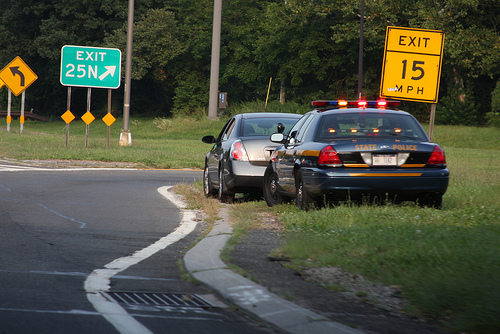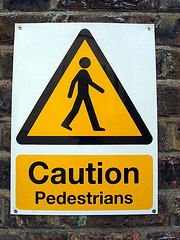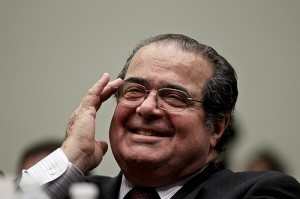Do traffic laws apply to me?

Many of the rules of the motor vehicle code apply to you, whether or not you have a learner′s permit or a driver′s license. Traffic laws exist for the benefit and safety of passengers and pedestrians, as well as the person behind the wheel.
For example, crossing the street anywhere but in a crosswalk or at a traffic signal (jaywalking) may be against the law in your state. The same is true for hitchhiking and walking in the street off the sidewalk. You may be fined or given community service hours for each offense.

Photo by Everydaylifemodern (Flickr)
Your local traffic laws may also apply to bicycle riders. One law, for example, requires that you ride only on a regular and permanent seat, and only one person per seat. In some places, if a passenger is under four years of age or under forty pounds, he or she must wear a helmet. Wearing a personal stereo headset while bicycling may also be illegal. Holding onto a moving car while on a bike, inline skates, or skateboard is both dangerous and against the law.
Bike paths are to be used wherever they′re available, and all riders should keep at least one hand on the handlebars at all times. Bike riding while under the influence of drugs or alcohol is illegal.
If you′re riding at night, your bike should have a white or yellow reflector on the front and a red one on the back. Your town may also have special laws regarding the use of skateboards, inline skates, and go-peds. If you break a traffic law, the judge may do one or more of the following:
• talk to you about the incident and the driving laws of your state
• ask the county or district attorney to take a look at the case and consider filing a charge against you
• take your license or permit away for a period of time or restrict your driving
• order you to go to traffic school
• order you to pay a fine, which could be hundreds of dollars
• order you to be supervised by a probation officer for a period of time
• require you to fix your car so it meets the minimum requirements of the law
• order you to complete a number of community service hours
The bottom line is to know what the laws are where you live, follow them, and use common sense and caution regarding all traffic situations.
 Update: As you know from the adults in your life, no one is above the law or exempt from getting a traffic ticket, including U.S. Supreme Court Justices. On March 29, 2011, Justice Antonin Scalia was on his way to work at the court in Washington, D.C. Caught in traffic, he rear-ended a car that resulted in a four-car chain reaction. There were no injuries and his car was towed from the scene. He was cited for following too closely. He can either pay the $90.00 fine or contest the ticket in court. (Photo by Stephen Masker (Flickr))
Update: As you know from the adults in your life, no one is above the law or exempt from getting a traffic ticket, including U.S. Supreme Court Justices. On March 29, 2011, Justice Antonin Scalia was on his way to work at the court in Washington, D.C. Caught in traffic, he rear-ended a car that resulted in a four-car chain reaction. There were no injuries and his car was towed from the scene. He was cited for following too closely. He can either pay the $90.00 fine or contest the ticket in court. (Photo by Stephen Masker (Flickr))
Then in October, 2013, former First Lady and Secretary of State, Hillary Clinton, was cited for parking 45 minutes longer than her meter allowed in London. The ticket carries a fine of $127.00 that is cut in half if she pays it within 14 days.



Hello,
I’m the author of the Scalia image. Congressmen, and by extension of their office, Supreme Court justices, are granted diplomatic immunity when transiting to or from their positions of office. This is to prevent the wrongful arrest and/or detainment of salient federal officials.
Article 1, Section 6, Clause 1 of the United States Constitution.
Thank you, Stephen, for this information.